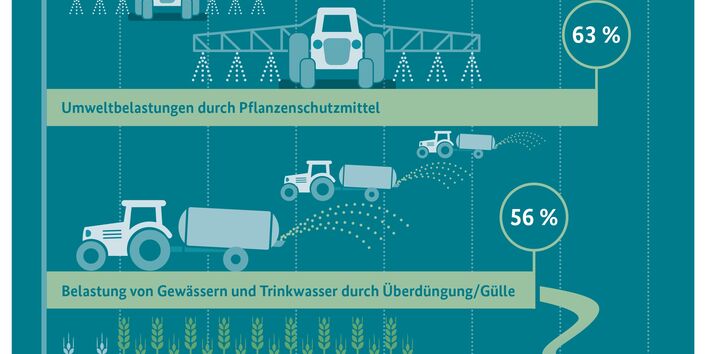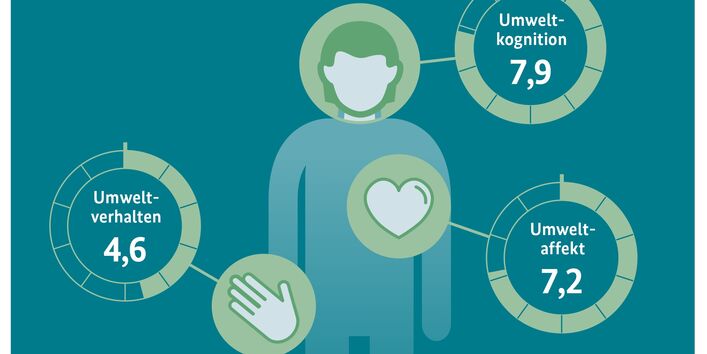Environmental Awareness Study 2018
Environmental and climate protection have become considerably more important among the public in recent years. These are the findings of the environmental awareness survey which Federal Environment Minister Svenja Schulze and the President of the German Environment Agency (UBA), Maria Krautzberger, presented today. The majority of the population believes that the important stakeholders (industry, federal government, local authorities) are not yet doing enough – and are also critical of their own commitment as citizens. Every other year the Federal Ministry for the Environment and UBA conduct the Environmental Awareness Survey to assess the trends in environmental awareness and environmental behaviour of the German people. Some 4,000 people were polled for the current survey in the second half of 2018.
The study shows that the population considers environmental protection to be a task for all policy areas. The areas "agriculture" and "mobility" revealed a wide gap between the wish expressed by respondents to put as little burden on the environment and climate as possible and what they perceive as political priorities in these areas. Most respondents agree with the goals of the Energiewende, or energy transformation. However, the majority also said that the Energiewende must be implemented more swiftly.
Federal Environment Minister Schulze said: "The 2018 environmental awareness study shows that citizens have recognised the urgency of environmental and climate protection. Most respondents also see insufficient action, which I interpret as a mission for government. We must create better overall conditions in climate mitigation action. That’s why I’m pushing for a socially just CO₂ price and a binding climate action law. Respondents have called for faster execution of the Energiewende. I agree, and so we must finally release the brakes on the development of wind and solar energy."
Nearly two-thirds (64%) of the population in Germany consider environmental protection and climate change mitigation to be a high-priority challenge – 11 percentage points more than in 2016. A majority of the respondents said environmental concerns should be given higher priority, in particular in the areas of agriculture, transport, building and energy.
The environment in Germany is rated in worse condition than in earlier surveys. Only 60% of respondents rate it as "good", compared to 75% in the previous survey. UBA's President Krautzberger said: "The effects of climate change were felt in Germany during the extremely hot summer last year. Insect die-off, the debate about air quality in cities or marine litter have shown just how much our natural environment is at risk. I also interpret the results of the survey as a plea to everyone to act with greater consideration of environmental issues."
People's higher expectations are also reflected in the poorer ratings of the action taken by the authorities responsible for environmental protection and climate change mitigation. Only 8% are satisfied with how much industry is doing ("doing (somewhat) enough"), and 14% say the same about the federal government. The involvement of cities and communities is rated 'satisfactory' by 24% of respondents, and 71% approved of environmental associations' action. Respondents were also critical of their own involvement: only 19% believed that their fellow citizens are doing enough, compared to 34% in the survey two years ago.
This year's survey focused on the three key areas "energy", "agriculture", and "transport":
Energy: There is a remarkably high level of agreement with the goals and strategies of the Energiewende. 95% believe that increasing energy efficiency through new technologies is key to achieving energy transformation, and 92% are in favour of the further development of renewable energy. At the same time, 81% believe the pace of the Energiewende is too slow; 76% criticise what they perceive as the unfair distribution of the costs of the Energiewende.
Agriculture: 68% of those surveyed would like to see environmental and climate aspects play a major role in agricultural policy. According to the survey, the most important factors for the future development of agriculture are as follows: to mitigate pollution as much as possible (ranked Nr. 1 by 45%), followed by a food supply that offers variety, high quality and is healthy (ranked Nr. 1 by 43%). A majority of those polled (86%) believe that agricultural policy is geared towards the interests of industry. Only 22% said that current agricultural policy is geared towards environmental protection and climate change mitigation.
Transport: More than half of all respondents (53%) said that environmental protection and climate change mitigation should play a higher role in transport policy. The most important factors in the development of the transport sector are as follows: to mitigate pollution as much as possible (ranked Nr. 1 by 50%); ease of everyday travel and at low cost (ranked Nr. 1 by 40%). Again, a majority of respondents (89%) believe that transport policy is geared towards the interests of industry. Only 27% said that transport policy is geared towards the interests of the public, and only 21% said policy is geared towards environmental protection and climate change mitigation.






